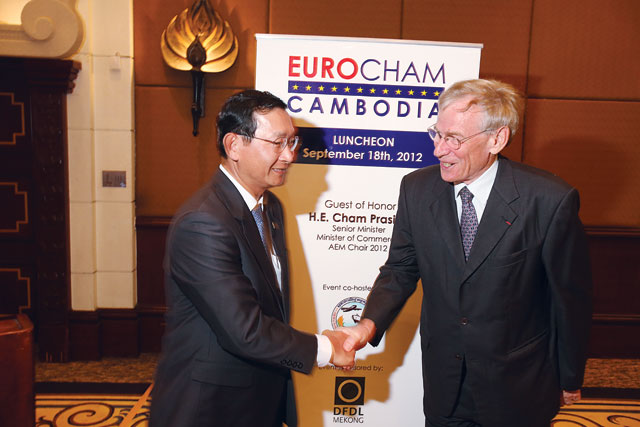Exports from Cambodia to the EU continued their upward trend last year, reaching $2.3 billion. Sheila Scopis, executive director of the European Chamber of Commerce (EuroCham) in Cambodia, discusses the group’s work in the Kingdom and beyond
 How has EuroCham evolved since its inception two years ago? Has it found its voice within the Cambodian and regional business community?
How has EuroCham evolved since its inception two years ago? Has it found its voice within the Cambodian and regional business community?
I think that EuroCham found a voice within these business communities right after its inception. The Ministry of Commerce and the European Commission invited EuroCham to play a leading role in organising the 2nd Asean-EU Business Summit, which was held in Phnom Penh last year. The forum was chaired by Prime Minister Hun Sen, and more than 300 international business leaders attended to discuss opportunities, challenges and recommendations to facilitate an improved business environment for the EU, the world’s largest economic union, and Asean, one of the world’s most dynamic emerging markets. Since then, EuroCham has also launched a number of sectorial committees and established participation in networks such as the EU-Asean Business Council and the Global European Business Organisations.
In which areas can EuroCham support and improve the business environment?
EuroCham Cambodia offers a range of services that aim to assist businesses at all stages of their establishment in Cambodia. These range from the organisation of trade missions and market research, to business-matching and assistance in bureaucratic procedures, such as registration
at the various ministries.
In terms of improving the business environment, EuroCham’s ultimate mandate is advocacy. Our aforementioned sectorial committees – the Pharma Group, Logistics and Transportation, Green Business, Real Estate and Construction – provide a platform for its members to identify common issues and present them directly to the Cambodian government.
As an example of the committees’ activities, some of the Pharma Group’s key objectives are: raising awareness among patients of the risk of counterfeit medicines; advocating the interests of pharmaceutical companies to relevant authorities; [and] communicating the commitment of pharmaceutical companies to high standards of safety to healthcare professionals.
While all of these committees work under EuroCham’s umbrella, they are essentially autonomous – the initiative always comes from our members, the private sector. In addition to working on position papers, the committees are encouraged to initiate and plan events on behalf of EuroCham. For instance, our Green Business committee is currently organising a Green Business Forum, which will be held on December 6, 2013.

What is EuroCham’s role in contributing to the European Asean Business Council (EABC)?
EuroCham Cambodia participates in the EABC together with a number of EuroChams in the region – Singapore, Malaysia, Indonesia, Laos, Philippines, Vietnam and Thailand. The council advocates the interests of European businesses at an Asean level.
Through regional working groups and committees, the EABC identifies key regulatory issues and barriers that affect European businesses.
It then collects relevant information and develops strategies that seek to reduce such impediments, with a focus on key market issues with a regional impact and free trade agreements.
EuroCham Cambodia has been directly involved in the rewriting of the EABC’s statute, defining its internal procedures and outlining its organisational structure in a way that promotes a fruitful dialogue between its members – private corporations on the one hand and business associations on the other.
How does EuroCham differ from other business organisations such as the International Business Chamber (IBC)?
IBC was born as ‘the corporate club’ and still represents a forum for big corporations to speak with one voice, while EuroCham’s base is much broader. We are in the process of forming a committee dedicated to SMEs and, in the near future, will implement a number of programmes focused on business development and support services that we hope will attract more European SMEs to Cambodia.
That said, we have always seen IBC as a crucial partner, rather than a competitor. We have started to work together on a number of initiatives, such as the National Arbitration Council (NAC) among others.
EuroCham’s founding members – the Chambre de Commerce Franco-Cambodgienne (CCFC) and the German Business Group (ADW) – are planning to merge into EuroCham. What effect will this have?
The result will be a bigger, stronger, more effective chamber that will be in a better position to represent European companies’ interests and interact with the Cambodian government, as well as Asean in general. It will help avoid overlapping in the provision of services, strengthen our sectorial committees and allow us to play a more substantial role in various types of government-private sector dialogues.
Photo: Sam Jam for Focus Asean (1)

